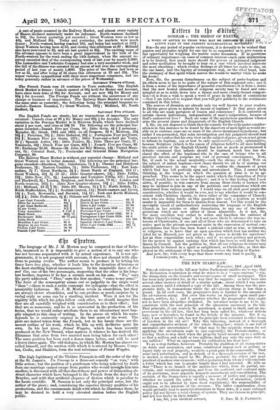THE NEW STAMP-LAW.
Worcester, 18th April 1860.
Sitt--vi reference to the bill now before Parliament enables me to say, that Mr. Richardson is mistaken in what he states to be " casus conissue,"—viz. the stamp-duty on the transfer and reconveyance of small mortgages. This has been duly provided for in the way that he suggests ; as have been also several other matters of detail of a similar natio°, about which I was under some anxiety until I obtained a copy of the bill. Among these was the pro- gressive duty, in transactions where the ad-valorem stamp is loss than a pound. In all such cases, the progressive duty is limited to the amount of the ad-valorem stamp. But even this works an injustice upon small pur- chasers, settlers, &c. ; and I question whether the progressive duty ought not to have been altogether abolished. Its retention seems to me to be in- consistent with the real principle of the alteration embraced in the bill. That principle, it can scarcely be questioned, is sound in itself, and an im- provement on the old law, that has long been called for, whatever defects may, now or hereafter, be found in the details of the measure. But if so, why, I am entitled to ask, has not the principle been extended to other items of taxation in the old act? Why this ;tinkering, instead of a thorough and comprehensive revision of the whole Stamp-law; which is one full of anomalies and uncertainties? Or what may be the exquisite reason for not applying the ad-valorem scale to (say especially) the Probate-duties ; or leaving them to stop short when the property taxed mounts up to a million, so that a million and a half or two millions shall pay only the same duty as one million? What an opportunity for codification has been lost !
To go a step farther, however. Probably the abolition of all stamp-duties on deeds and -assurances, and some substituted impost such as probate or legacy duty on real property, would be a great gain to the community. That some such substitution, and in default of it a thorough revision of the law,
is needed, is strongly urged by Mr. Hayes, probably the ablest and most practical of modern conveyancers; with a quotation from whom I will conclude a letter which has run to greater length than I had intended. He tells us that "There is no branch of the statute-law which, from its partial, un- certain, and vexatious operation, and from the scattered and confused state of its provisions, more urgently demands amendment and consolidation. The revision of the Stamp-laws is equally a measure of justice and expedience, whether we regard the safety of titles, the facility of alienation, (which ought not to be affected by mere fiscal regulations,) the responsibility of solicitors, or the interests of the revenue. The latter consideration alone would probably lead to material alterations in those laws, if a more enlarged policy did not dictate a total change of system. They axe vicious in principle, and not less faulty in their details."


























 Previous page
Previous page